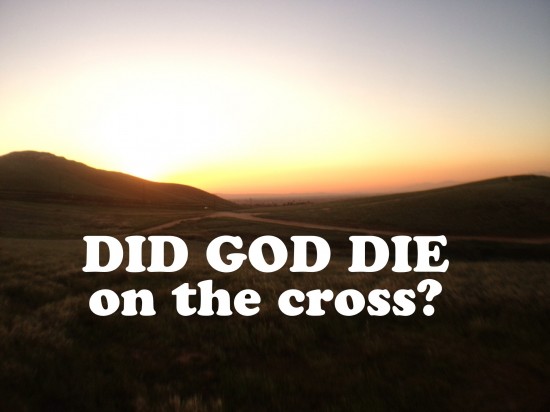Did God die on the cross? Good question. At least one popular preacher has a chapter of a book and a sermon entitled “GOD DIES” when dealing with the cross. But is that accurate? I’ve heard a number of younger guys speak of the cross in that way, but I’m not convinced that God did die on the cross. Below is an extract from Dr. R.C. Sproul’s tremendous little book The Truth of the Cross. In the final chapter Sproul has a Q+A section dealing with some tricky questions about the cross. I like his response for this question.

———-
The famous hymn of the church “And Can it Be?” contains a line that asks a very poignant question : “How can it be that thou, my God, shouldst die for me?” Is it accurate to say that God died on the cross?
This kind of expression is popular in hymnody and in grassroots conversation. So although I have this scruple about the hymn and it bothers me that the expression is there, I think I understand it, and there’s a way to give an indulgence for it.
We believe that Jesus Christ was God incarnate. We also believe that Jesus Christ died on the cross. If we say that God died on the cross, and if by that we mean that the divine nature perished, we have stepped over the edge into serious heresy. In fact, two such heresies related to this problem arose in the early centuries of the church: theopassianism and patripassianism. The first of these, theopassianism, teaches that God Himself suffered death on the cross. Patripassianism indicates that the Father suffered vicariously through the suffering of His Son. Both of these heresies were roundly rejected by the church for the very reason that they categorically deny the very character and nature of God, including His immutability. There is no change in the substantive nature or character of God at any time.
God not only created the universe, He sustains it by the very power of His being. As Paul said, “In Him we live and move and have our being” (Acts 17:28). If the being of God ceased for one second, the universe would disappear. It would pass out of existence, because nothing can exist apart from the sustaining power of God. If God dies, everything dies with Him. Obviously, then, God could not have perished on the cross.
Some say, “It was the second person of the Trinity Who died.” That would be a mutation within the very being of God, because when we look at the Trinity we say that the three are one in essence, and that though there are personal distinctions among the persons of the Godhead, those distinctions are not essential in the sense that they are differences in being. Death is something that would involve a change in one’s being.
We should shrink in horror from the idea that God actually died on the cross. The atonement was made by the human nature of Christ. Somehow people tend to think that this lessens the dignity or the value of the substitutionary act, as if we were somehow implicitly denying the deity of Christ. God forbid. It’s the God-man Who dies, but death is something that is experienced only by the human nature, because the divine nature isn’t capable of experiencing death.
———-
Extract from R.C. Sproul, The Truth of the Cross.
Originally posted here.

We talked about this at Thetacon this year :D
Did I remember to send you the papers?
what was the conclusion at thetacon?
and yes – you sent the papers. thanks
Yep. Mick’s paper interacted with Andrew Root’s ‘Taking the cross to youth ministry’ book, which says that on the cross, God takes death into his very nature; God dies on the cross, and so is fully with us in our little deaths – which Root refers to as ‘nothingness’.
Root really wants to emphasise the ‘God with us’ part of the incarnation in atonement, as something really relevant for youth ministry. He has some helpful things for the way we think through and do youth ministry, but ends up in theopassianism. Though the discussion didn’t go in to much detail there – we spent more time thinking about passibility/impassibility.
Mick’s response was to go to Cyril’s communication of idioms; we can say that Jesus’ human nature dies, we cannot say that the divine nature dies; but we can say that the Person of the Son dies.
In response to Mick’s paper, Jim asked the question (which we didn’t really explore): ‘is there any sense in which God has changed from or through ‘the Christ event’?’ … I think he was kind of referring to Article 2, which says that Jesus’ death happened ‘to reconcile his Father to us’ – not the other way around as we’d expect. O’ Donovan has a really cool chapter on that in his book on the Articles.
The two big landing things I got out of it was that…
1) This is all still a massive declaration of God’s love. Yet if we say ‘God dies’, then we’re saying the wrong thing. If God dies, the universe stops being. Yet in not saying ‘God dies’, we’re not saying something less about his immense love for us. The death of the Son of God is still huge, yet is not the end of the story. The Son of God doesn’t just empathise with us in our weakness and death; he conquers it for us.
2) For a teenager whose life and identity is a bit all over the place, when we say that God is ‘without passions’, we’re not saying that God is an impersonal and emotionless thing like a rock. God is both entirely stable AND relatable; his ’emotions’ (if we can use that word) are not dictated to him by us. And we can still say that the Son of God was fully human in every way, just as we are; so can empathise with us in our weakness.
Great minefield to explore. I agree with what you say and at the same time am wary of a Nestorian division as a result. Is Sproul perhaps basing his argument too much on a monolithic view of God?
I wonder if a Trinitarian approach may be a promising way out of the dilemma of holding the two natures together and yet avoiding the false view that God ceased to exist. Put positively, a Trinitarian view may help us to maintain both the undivided nature of the Son of God (even in his death), as well as maintaining that God didn’t stop to exist.
Also, what weight do we give to the fact that the Bible speaks of physical and spiritual death as two separate kinds of death. One question we may need to ask is whether Jesus died both deaths or whether it is sufficient for atonement that his undivided two natures died physically but not spiritually.
(By the way, I probably won’t be able to interact after my quick brain dump – apologies for that.)
Thanks for raising the Nestorian heresy, Klaus. A helpful point of correction and clarification.
There was a similar discussion last year around the interplay of Jesus’ human and divine natures in regards to his experiences of temptation. It was a long drawn out argument, but it all boiled down to either Nestorianism, or denying the impeccability of God, or something in between. A solution offered was Calvin’s thing about the two minds of Christ – the scenario being that while the earthly mind of Christ was lying in the manger, the divine mind of Christ was still actively sustaining the universe. So not going so far as to divide his natures, but still trying to work through the conundrum.
Hey Dave, this is the first time I have engage in a discussion online. I usually like to do it in person but this topic got me thinking and pressed me further on what I believe. Although I agree that God can not die 1 Tim 6:16 (God) “who alone is immortal” there are some dangers that need to be considered when speaking of the Atonement in this way.
Nestorianism: where a division of Jesus humanity and divinity occurs. It can lead to a belief that when the time came for Jesus to die on the cross, God withdrew his divinity and left simply the man to die. Along with this it can lead to an understanding that God didn’t suffer at all at the cross or Jesus was a separate 3rd party between us and God. The NT does not explicitly say God died at the cross, but the tension for me in all this is that the NT holds out Jesus “who was fully God and fully man” who suffered and died in our place for our sins (Acts 20:28, Heb 2:14, Phil 2:6-8). I like what Tertullian said “Let us be content with saying that Christ died, the son of the Father, and let this suffice, because the scriptures have told us so much.”
Just my 2 cents!
Souter
thanks for comments guys.
was hoping to get to them today… but Jesus is better!!!